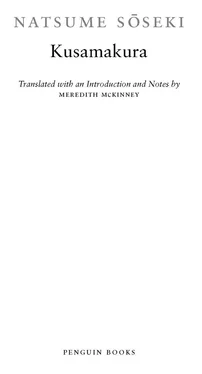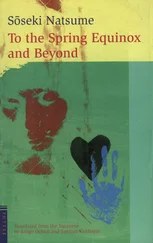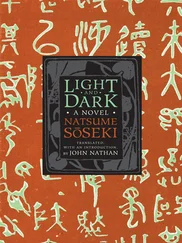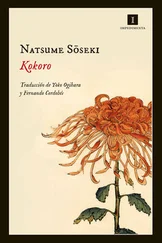Natsume Soseki - Kusamakura
Здесь есть возможность читать онлайн «Natsume Soseki - Kusamakura» весь текст электронной книги совершенно бесплатно (целиком полную версию без сокращений). В некоторых случаях можно слушать аудио, скачать через торрент в формате fb2 и присутствует краткое содержание. Жанр: Старинная литература, на английском языке. Описание произведения, (предисловие) а так же отзывы посетителей доступны на портале библиотеки ЛибКат.
- Название:Kusamakura
- Автор:
- Жанр:
- Год:неизвестен
- ISBN:нет данных
- Рейтинг книги:4 / 5. Голосов: 1
-
Избранное:Добавить в избранное
- Отзывы:
-
Ваша оценка:
- 80
- 1
- 2
- 3
- 4
- 5
Kusamakura: краткое содержание, описание и аннотация
Предлагаем к чтению аннотацию, описание, краткое содержание или предисловие (зависит от того, что написал сам автор книги «Kusamakura»). Если вы не нашли необходимую информацию о книге — напишите в комментариях, мы постараемся отыскать её.
Kusamakura — читать онлайн бесплатно полную книгу (весь текст) целиком
Ниже представлен текст книги, разбитый по страницам. Система сохранения места последней прочитанной страницы, позволяет с удобством читать онлайн бесплатно книгу «Kusamakura», без необходимости каждый раз заново искать на чём Вы остановились. Поставьте закладку, и сможете в любой момент перейти на страницу, на которой закончили чтение.
Интервал:
Закладка:
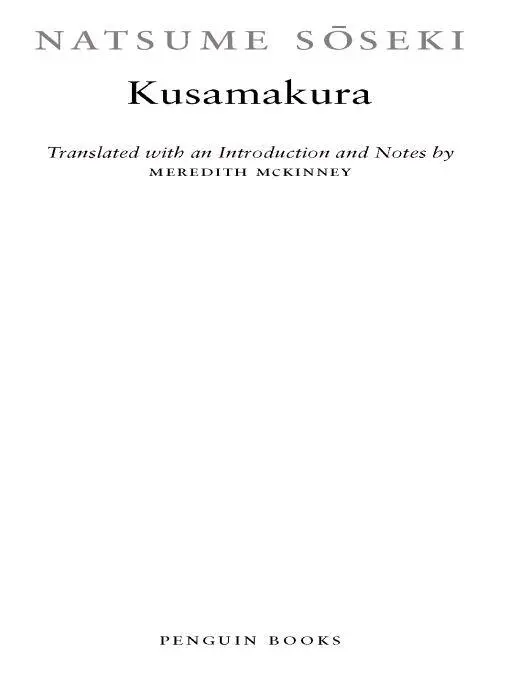

Table of Contents
Â
PENGUIN CLASSICS
Title Page
Copyright Page
Introduction
Acknowledgements
Â
CHAPTER 1
CHAPTER 2
CHAPTER 3
CHAPTER 4
CHAPTER 5
CHAPTER 6
CHAPTER 7
CHAPTER 8
CHAPTER 9
CHAPTER 10
CHAPTER 11
CHAPTER 12
CHAPTER 13
Â
Notes

PENGUIN CLASSICS
KUSAMAKURA
NATSUME SOSEKI (1867-1916), one of Japan’s most influential modern writers, is widely considered the foremost novelist of the Meiji era (1868-1914). Born Natsume Kinnosuke in Tokyo, he graduated from Tokyo University in 1893 and then taught high school English. He went to England on a Japanese government scholarship, and when he returned to Japan, he lectured on English literature at Tokyo University and began his writing career with the novel I Am a Cat . In 1908 he gave up teaching and became a ful -time writer. He wrote fourteen novels, including Botchan and Kokoro, as wel as haiku, poems in the Chinese style, academic papers on literary theory, essays, and autobiographical sketches. His work enjoyed wide popularity in his lifetime and secured him a permanent place in Japanese literature.
Â
MEREDITH MCKINNEY holds a Ph.D. in medieval Japanese literature from the Australian National University in Canberra, where she teaches at the Japan Centre. She taught in Japan for twenty years and now lives near Braidwood, New South Wales. Her other translations include Ravine and Other Stories by Furui Yoshikichi, The Tale of Saigyo, and, for Penguin Classics, The Pillow Book of Sei Shonagon.

PENGUIN BOOKS
Published by the Penguin Group
Penguin Group (USA) Inc., 375 Hudson Street, New York, New York 10014, U.S.A.
Penguin Group (Canada), 90 Eglinton Avenue East, Suite 700, Toronto, Ontario, Canada M4P 2Y3
(a division of Pearson Penguin Canada Inc.)
Penguin Books Ltd, 80 Strand, London WC2R 0RL, England
Penguin Ireland, 25 St Stephen’s Green, Dublin 2, Ireland (a division of Penguin Books Ltd) Penguin Group (Australia), 250 Camberwell Road, Camberwell, Victoria 3124, Australia (a division of Pearson Australia Group Pty Ltd)
Penguin Books India Pvt Ltd, 11 Community Centre, Panchsheel Park, New Delhi-110 017, India Penguin Group (NZ), 67 Apollo Drive, Rosedale, North Shore 0632, New Zealand
(a division of Pearson New Zealand Ltd)
Penguin Books (South Africa) (Pty) Ltd, 24 Sturdee Avenue, Rosebank,
Johannesburg 2196, South Africa
Â
Penguin Books Ltd, Registered Offices:
80 Strand, London WC2R 0RL, England
Â
This translation first published in Penguin Books 2008
Â
Translation and introduction copyright © Meredith McKinney, 2008
All rights reserved
Â
LIBRARY OF CONGRESS CATALOGING-IN-PUBLICATION DATA
Natsume, Soseki, 1867-1916.
[Kusamakura. English]
Kusamakura / Natsume Soseki ; translated with an introduction by Meredith McKinney.
p. cm.—(Penguin classics)
eISBN : 978-1-101-09755-7
1. McKinney, Meredith, 1950- II. Title.
PL812.A8K813 2008
895.6’342—dc22 2007024784
Â
Â
Â
The scanning, uploading, and distribution of this book via the Internet or via any other means without the permission of the publisher is illegal and punishable by law. Please purchase only authorized electronic editions, and do not participate in or encourage electronic piracy of copyrighted materials. Your support of the author’s rights is appreciated.
http://us.penguingroup.com
Introduction
Kusamakura (1906) is an extraordinary work, written at an extraordinary time in Japan’s history, when the nation was tumbling headlong into the twentieth century and toward its “modern miracle,†even as its traditional past everywhere stil haunted it. Kusamakura was conceived out of this double consciousness and embodies it in fascinating ways. It is very much a novel of its historical moment, a literary experiment that was as new and exciting as the great experiment that was Meiji-era Japan.
Until 1868, when the Meiji era began, Japan had maintained a fiercely isolationist policy that kept it cultural y and political y intact for centuries.
When the nation final y chose, after a brief internal struggle, to submit to external pressure and open its doors, this largely untouched world of “old Japan†was suddenly subjected to violent upheavals, with the immediate rush to modernize and Westernize. In Kusamakura the powerful and inexorable transforming impetus that was impel ing Japan out of its past and into a very different future is embodied in the image of the steam train of the final scene “hurtling blindly into the darkness ahead†with its freight of hapless passengers, an image of the sinister “serpent of civilization†that carries the novel off into its open-ended future. In this final scene the steam train is bearing away men who are leaving to fight in the Russo-Japanese War of 1904-5, a war that had just drawn to its victorious end when Natsume Soseki wrote this work. Though written at the height of the nationalistic fervor that fol owed this victory, the novel portrays the war as a bloodbath whose distant echo of guns has penetrated even the idyl ic peace of a mountain vil age that is otherwise virtual y untouched by the modern world. Unlike so many of his contemporaries, Soseki had a complex and deeply uneasy relationship with the new modernity.
Kusamakura is at odds not only with the generalized euphoric embrace of modernity but also more specifical y with the contemporary trends in Japan’s modern literature. Japanese prose writers had rushed to reject the earlier traditions and set about forging a new literature modeled on Western concepts of the novel. The Naturalism of nineteenth-century French writers such as Émile Zola provided the model for works that aimed at a gritty realism and an emphasis on human entanglements. Soseki, however, instinctively rebel ed against this unthinking rejection of Japan’s native literary tradition and the focus on the more squalid aspects of the human world. Kusamakura is his attempt at an answer to this literary vogue, reaching back into Japan’s literary past to bring its riches to bear on the possible evolution of the new Japanese novel.
Soseki was in an ideal position to seek a new literary synthesis of “East and West.†Natsume Kinnosuke (Soseki was his nom de plume) was born in 1867, the final year of the old regime, into a family of minor bureaucrats whose fortunes declined rapidly with the onset of the Meiji era.
A late and unwanted child in a large family, he was adopted the fol owing year by a childless couple, then returned nine years later, when the couple divorced, to his parents (whom he believed to be his grandparents). This loveless and lonely childhood marked him with a sense of estrangement and dislocation that haunted him through his adult years and that echoed the dislocations and questioning of identity that were hal marks of Meiji-era Japan.
Читать дальшеИнтервал:
Закладка:
Похожие книги на «Kusamakura»
Представляем Вашему вниманию похожие книги на «Kusamakura» списком для выбора. Мы отобрали схожую по названию и смыслу литературу в надежде предоставить читателям больше вариантов отыскать новые, интересные, ещё непрочитанные произведения.
Обсуждение, отзывы о книге «Kusamakura» и просто собственные мнения читателей. Оставьте ваши комментарии, напишите, что Вы думаете о произведении, его смысле или главных героях. Укажите что конкретно понравилось, а что нет, и почему Вы так считаете.
